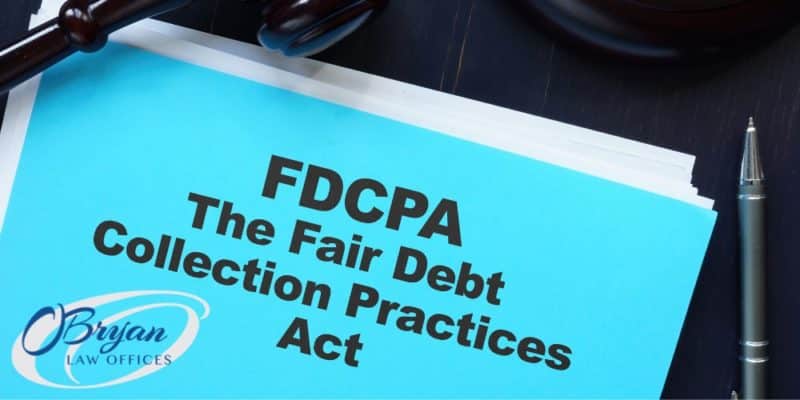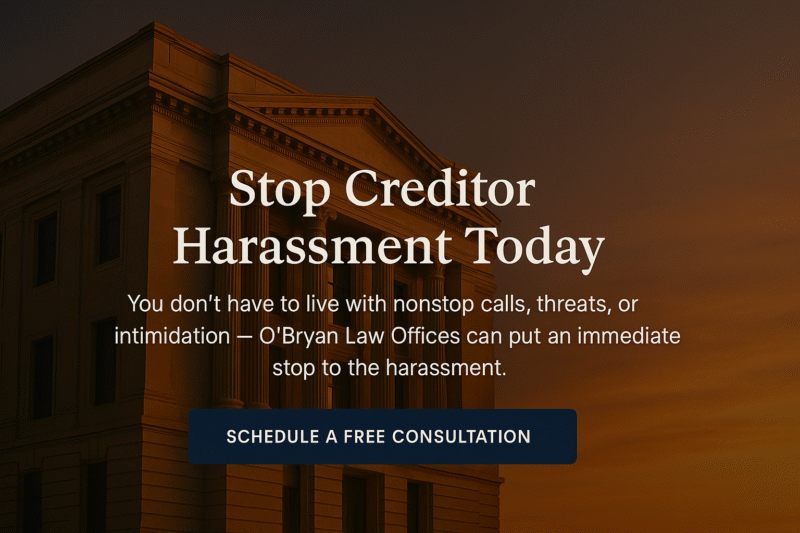Louisville credit harassment lawyer

When you’re overwhelmed by nonstop collection calls, threats, and pressure tactics, you need a creditor harassment attorney in Louisville who understands exactly what you’re going through — and O’Bryan Law Offices is here to help. Creditor harassment can make every ring of your phone feel like a new wave of stress, especially when collectors ignore boundaries, call at all hours, or try to intimidate you into paying what you can’t afford.
You shouldn’t have to face this alone. Our attorneys use federal and state laws — including the automatic stay in bankruptcy — to stop creditor harassment immediately and give you the protection you deserve.
Call O’Bryan Law Offices at (502) 339-0222 to put an end to the harassment and take back control of your financial life.
What Is the Fair Debt Collection Practices Act (FDCPA)?

According to the Federal Trade Commission (FTC), the Fair Debt Collection Practices Act is the principal federal law that limits how far a debt collector can go to collect. It often works in tandem with the Fair Credit Reporting Act, which outlines how debt collection must be reported in someone’s credit report. If a debt collector participates in collection activities that go against the FDCPA, they have committed FDCPA violations and may face penalties.
What Types of Debt Are Covered by the FDCPA?
Keep in mind that the Fair Debt Collection Practices Act does not completely eliminate the ability of a debt collector to contact you about certain debts. Generally speaking, a debt collector cannot engage in abusive, deceptive, or unfair debt collection practices. The specific debts that the FDCPA covers include the following.
- Credit card debt
- Medical bills
- Mortgage debt
- Other types of personal debts that concern you, your family, or your household
The FDCPA also does not cover business debts. Additionally, it usually does not cover collections initiated by an original creditor. Debt collectors that the FDCPA does apply to include the following.
- Debt buyers
- Attorneys who collect debts as a part of their business
- Debt collection agencies
What Can Debt Collectors Not Do?
The Fair Debt Collection Practices Act specifically prohibits debt collectors from doing any of the following.
- Contacting you at unusual times or places (before 8 AM or after 9 PM)
- Calling you at work even if they already know they’re not supposed to
- Harassing you or anyone you know over the phone or through other forms of contact
- Contacting you after they have been informed that you have legal representation
Debt collectors may not continue to contact you if they know that you are represented by a creditor harassment attorney. If a debt collector calls you after you’ve retained a lawyer, give them the name and contact information of your attorney and ask them to stop calling you. Legally, they must respect your request and talk with your attorney as soon as they know you have one.
How Does the Fair Credit Reporting Act Help Me?
You’re probably well aware of how important your credit report and credit scores are. The Fair Credit Reporting Act outlines exactly how certain financial information, such as debt collection, can be shown on your credit report. Other state and federal laws exist that provide protections for consumers against the following.
- Obscene or profane language from a debt collector
- Deceptive practices for debt collection
- False or misleading representations on credit reports
- Constant telephone calls
- Other unfair practices for collecting debts
Kentucky Debt Collection Laws
First off, it’s important to know that Kentucky actually has a statute of limitations on debt. According to the state laws in Kentucky, the statute of limitations on filing a lawsuit for debt owed is five years from the last action on the account. If someone has debts that are older than the statute of limitations, these are called time-barred debts. Debt collectors can no longer attempt to collect on these debts, nor can they file a lawsuit for them.
Additionally, Kentucky follows federal guidelines when it comes to limitations on wage garnishments. The Fair Labor Standards Act prohibits debt collectors from garnishing more than 25% of someone’s wages per pay period. They can, however, garnish any disposable income that is greater than 30 times the federal minimum wage. Between this amount and 25% of someone’s income, they must choose to garnish the smaller amount.
What Can You Do if You Are Being Harassed by Debt Collectors?

We understand how scary and frustrating it can be to face aggressive or persistent debt collectors on your own. Luckily, our attorneys are here to help protect consumers in Kentucky and Indiana from deceptive practices from their creditors. We will also outline and explain your options for dealing with debt collectors and getting your finances back on track.
Follow these tips to help stop creditor harassment.
Know Your Rights
Many people feel powerless when dealing with debt collectors, but you are not under their control. Even if collectors are aggressive or impolite, it is important to stay calm and remember that federal law limits what they can say and do. You have clear rights under the Fair Debt Collection Practices Act (FDCPA), and knowing those rights can help you take back control of the situation.
Collectors cannot call before 8 AM or after 9 PM unless you give them permission, and they must stop calling your workplace if your employer prohibits personal calls. They may not discuss your debt with family, neighbors, or coworkers, and they cannot use threats, lies, or abusive language to pressure you into payment. If you tell a collector to stop contacting you, they must honor your request once it is made in writing.
You also have the right to demand proof of the debt. Within five days of their first contact, a collector must send written validation showing the amount owed, the name of the original creditor, and information about your right to dispute the debt. Until the debt is verified, the collector must stop trying to collect it. Sending a certified letter gives you documentation that you asserted your rights and set clear boundaries.
Under the FDCPA, debt collectors are prohibited from:
- Repeatedly calling you or calling at unreasonable hours
- Contacting your employer after you tell them not to
- Failing to identify themselves or using deceptive tactics
- Contacting your friends, family, or neighbors without permission
- Threatening arrest, custody issues, or loss of benefits
- Threatening repossession when not authorized by law
- Using obscene, insulting, or harassing language
- Contacting you directly after you have told them to speak with your lawyer
To help you recognize violations more easily, here are specific examples of conduct that breaks federal law:
| Type of Violation | Example of Illegal Collector Behavior |
|---|---|
| Harassing phone activity | Calling you 10–20 times per day, or calling every hour to pressure you into paying. |
| Calling at improper times | Calling before 8 AM, after 9 PM, or contacting you repeatedly during working hours after being told not to. |
| Workplace violations | Calling your employer to discuss your debt, or continuing to call you at work after you said your employer forbids personal calls. |
| False or misleading statements | Claiming you will be arrested, lose your job, or go to jail if you don’t pay immediately. |
| Threats or intimidation | Threatening to repossess property without legal authority or claiming they will garnish your wages without a court order. |
| Privacy violations | Telling your family, neighbors, or coworkers that you owe a debt or asking them to “deliver messages” to embarrass you. |
| Identity and disclosure failures | Refusing to give their name, company, or reason for calling, or pretending to be an attorney or government official. |
| Ignoring legal representation | Continuing to contact you directly after being told you hired a lawyer. |
| Refusing written verification | Declining to send a debt validation letter or trying to collect while the debt is still disputed. |
Using a Stop Letter to Make Collection Calls Stop
A stop letter is a written request telling a debt collector to cease all contact, and it is one of the most effective ways to enforce your rights under the FDCPA. Sending this letter by certified mail creates proof that you asked the collector to stop calling and sets clear boundaries for future communication. After receiving your letter, the collector may send only one final notice confirming they will no longer contact you.
Your stop letter should include your name, account number, and a simple statement that all future communication must be in writing or directed to your attorney. Keep a copy of the letter and the mailing receipt in case the collector ignores your request. If a collector continues calling after receiving your stop letter, you may have grounds for legal action.
Make Sure That There Is Proof of Debt
While many people assume they have debt because a debt collector has called them, the truth is that you should never pay anything until you’re given a notice and proof of the debt. If the company calling you cannot provide you documentation of the debt, then simply tell them to stop contacting you.
Even if you’re aware of the debt you owe, make the creditor prove the debt to you. This step can protect you from fraud. Also, sometimes a third party company may buy the debt without receiving proof of it. That type of situation will only work to your advantage.
Always be upfront about your situation. If you cannot pay a debt, then tell the creditor the truth. If you know you’ll have some money in the future, then give them an estimated time when you expect to pay the debt off. Doing so could also help stop those incessant phone calls.
Work Out a Deal
Fortunately, not all creditors are impossible to work with. Some creditors may even be willing to work with you. For example, they may allow you to make smaller payments if you pay a lump sum upfront. Or, they may even allow you to pay only a percentage of the entire amount owed instead of the whole thing. Third party companies will be more willing to work with you, since they more than likely bought your debt for much less than what it’s worth.
Speak with a Kentucky Bankruptcy Lawyer
If you feel you’re a victim of creditor harassment, contact an experienced Kentucky bankruptcy attorney at O’Bryan Law Offices today. You have the right to sue debt collectors for harassment, but many debtors are unaware of this right. If a debt collector violated any part of the FDCPA in their communications with you, you can also file a complaint with the state or federal government.
If you wish to file a complaint on a federal level, you can report the debt collector to the Federal Trade Commission. Keep in mind that complaints can be filed under state or federal law. In Kentucky, you can file a consumer complaint against a debt collector with the attorney general’s office. No matter whether your complaint is filed on a state or federal level, you’ll need to provide the following information.
- Name and address of the collection agency or debt collector
- Name and contact information of your original creditor
- Witness names and contact information
- Date and time records of all debt collector contact
- Other important materials, such as recorded conversations, written communications, and any logs you have of the harassment
What Are Your Rights Against Lenders and Creditors?

Consumers and debtors often don’t realize how many rights they have when it comes to lending and debt collection. In fact, many debt collectors don’t want consumers to know their rights, as this makes it easier for them to take advantage of those who are already struggling. Not only do state and federal laws protect consumers from shady lending practices, but they also prevent debt collectors from acting in certain ways.
They even receive protections from discrimination. For example, lenders may not discriminate against borrowers on the basis of race, age, ethnicity, religion, sex, and many other attributes. We recommend establishing an attorney-client relationship with a skilled attorney in your area. This way, you can rest assured that your legal counsel will know all federal, state, and local protections available to you.
How Bankruptcy Stops Creditor Harassment
Bankruptcy is one of the strongest tools available for ending debt harassment because it immediately places a legal barrier between you and aggressive debt collection companies. As soon as you file for bankruptcy, the automatic stay goes into effect, which is a federal court order requiring all debt collector’s to stop contacting you. This means the phone calls, letters, wage garnishments, threats, and collection lawsuits must come to a complete halt the moment your case is filed.
The automatic stay works by shifting all collection activity away from you and into the hands of the bankruptcy court. Instead of trying to pressure you directly, creditors must communicate through your attorney and follow strict legal procedures. Even if a collector contacts you by mistake, providing your case number and attorney’s information is usually enough to make the calls stop immediately.
Bankruptcy also helps by giving you structure and clarity during the financial recovery process. In Chapter 7, qualifying unsecured debts can be fully discharged, leaving debt collection companies with nothing left to pursue. In Chapter 13, your debts are reorganized into a manageable repayment plan, and you remain protected throughout the entire 3–5-year process.
Here are the main reasons bankruptcy is so effective at stopping creditor harassment:
- The automatic stay applies instantly, even before a judge reviews your case.
- Collectors who violate the stay can face penalties, fines, and court sanctions.
- All communication must go through your bankruptcy attorney, not you.
- Many unsecured debts can be discharged, eliminating future collection attempts.
- You stay protected for the duration of your case, including the full Chapter 13 plan.
By choosing to file for bankruptcy, you gain the protection of federal law and finally stop the constant pressure from debt collection companies. If you’re ready to regain control of your finances and put an end to relentless creditor harassment, contact us today to speak with an experienced Kentucky bankruptcy attorney.
Benefits of the Automatic Stay
The automatic stay also helps with a few situations other than debt collector harassment. You can also achieve relief from the following through filing bankruptcy and getting the protection of the automatic stay.
- Foreclosure proceedings
- Disconnected utilities
- Eviction
- Multiple wage garnishments
- Public benefit overpayment collections
Contact the Experienced Louisville Creditor Harassment Attorneys at O’Bryan Law Offices
If you’re struggling to manage debt from auto loans, medical debts, or other household debts, you may have encountered persistent debt collectors. Enduring harassment from a debt collector can not only affect you, but also your family. As a consumer, you have certain rights and protections against certain forms of debt collector contact. O’Bryan Law Offices is here to help you on your path to managing debt, stopping creditor harassment, and taking advantage of the legal protections of bankruptcy. Contact us to schedule a free initial consultation. We have offices in Louisville, Frankfort and New Albany.
Call us at 502-339-0222 or contact us online.
Frequently Asked Questions About Creditor Harassment
Yes. Although you can ask verbally, the most effective way to stop calls is to send a letter requesting that all communication stop. Under the FDCPA, once a collector receives your written request, they may only contact you to confirm they received it or to inform you of legal action they intend to take.
Debt harassment includes repeated calls, threats, abusive language, contacting you at work, or discussing your debt with other people. If any debt collector’s behavior makes you feel intimidated, embarrassed, or pressured, it may qualify as illegal harassment under the FDCPA.
No. Debt collector’s may only contact another person to confirm your location, and even then, they cannot reveal that you owe a debt. If a collector is telling family members, neighbors, or your employer about your debt, that is a clear violation of federal law.
You should take legal action if a debt collector continues to harass you after receiving your written cease-contact request, refuses to verify a debt, or violates your rights under the FDCPA. Consumers can recover damages, attorney’s fees, and other costs when they win harassment claims.
Absolutely. When you send a letter by certified mail, you create a paper trail showing when you asked the collector to stop contacting you. If harassment continues, this documentation becomes powerful evidence when you file complaints or take legal action.


